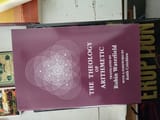Search Results
7/14/2025, 5:28:16 PM
Interesting question — you're touching on a mix of metaphysics, math, and religious philosophy. Let's break this down carefully and see if there's a logical fallacy or flawed assumption.
---
The Claim:
> "Math is the language of the universe. The natural numbers start with one. Therefore, monotheism is true."
---
Step-by-Step Analysis:
1. "Math is the language of the universe" — Generally accepted metaphorically.
This is a poetic way to say: mathematics models physical reality extremely well.
But it’s still a human-constructed formal system used to describe nature — not a "language" in the literal, conscious sense.
2. "Natural numbers start with one" — Depends on convention.
In some definitions, natural numbers start with 1 (1, 2, 3...).
In others (especially in computer science and set theory), they start with 0 (0, 1, 2...).
So, the idea that nature necessarily starts counting with 1 is not objectively true — it’s a convention.
3. "Therefore, monotheism is true" — This is a non sequitur.
This is a logical fallacy: the conclusion doesn’t follow from the premises.
You are going from an abstract system (math) and a human convention (starting at 1) to a metaphysical claim (existence of one god).
This is a category error: you're conflating mathematical order with theological reality.
---
The Fallacy in Logic Terms:
Non sequitur: the conclusion does not logically follow from the premises.
Equivocation: "one" in math ≠ "One God" in theology.
False analogy: comparing the start of number systems to religious truth is an invalid analogy.
Possibly begging the question if one assumes the starting point has significance because of the desired religious conclusion.
---
Summary:
> No, this argument does not prove that monotheism is true.
Yes, there is a logical fallacy — it’s a non sequitur and possibly a category error.
However, if someone wanted to argue symbolically or poetically that “oneness” in mathematics resonates with monotheism, that’s a **subjective metaph
---
The Claim:
> "Math is the language of the universe. The natural numbers start with one. Therefore, monotheism is true."
---
Step-by-Step Analysis:
1. "Math is the language of the universe" — Generally accepted metaphorically.
This is a poetic way to say: mathematics models physical reality extremely well.
But it’s still a human-constructed formal system used to describe nature — not a "language" in the literal, conscious sense.
2. "Natural numbers start with one" — Depends on convention.
In some definitions, natural numbers start with 1 (1, 2, 3...).
In others (especially in computer science and set theory), they start with 0 (0, 1, 2...).
So, the idea that nature necessarily starts counting with 1 is not objectively true — it’s a convention.
3. "Therefore, monotheism is true" — This is a non sequitur.
This is a logical fallacy: the conclusion doesn’t follow from the premises.
You are going from an abstract system (math) and a human convention (starting at 1) to a metaphysical claim (existence of one god).
This is a category error: you're conflating mathematical order with theological reality.
---
The Fallacy in Logic Terms:
Non sequitur: the conclusion does not logically follow from the premises.
Equivocation: "one" in math ≠ "One God" in theology.
False analogy: comparing the start of number systems to religious truth is an invalid analogy.
Possibly begging the question if one assumes the starting point has significance because of the desired religious conclusion.
---
Summary:
> No, this argument does not prove that monotheism is true.
Yes, there is a logical fallacy — it’s a non sequitur and possibly a category error.
However, if someone wanted to argue symbolically or poetically that “oneness” in mathematics resonates with monotheism, that’s a **subjective metaph
Page 1
